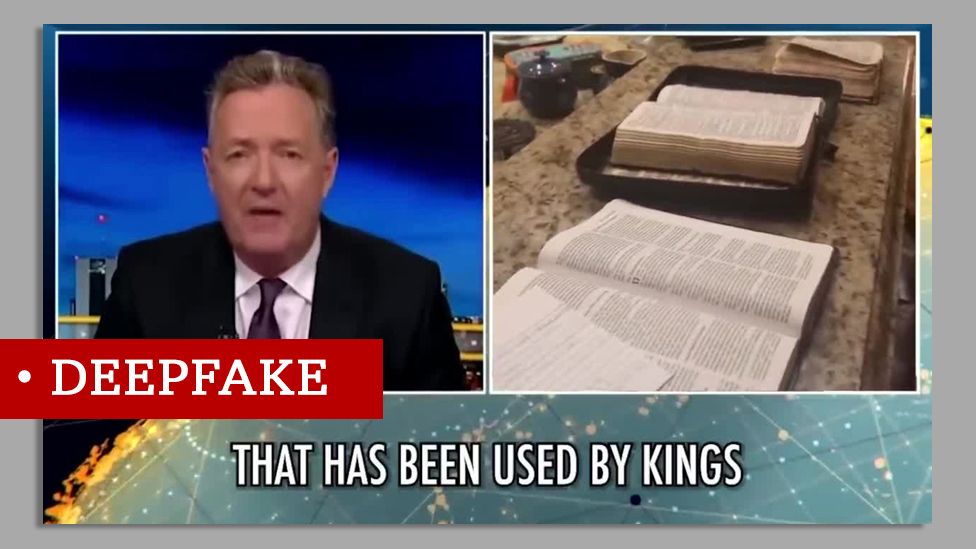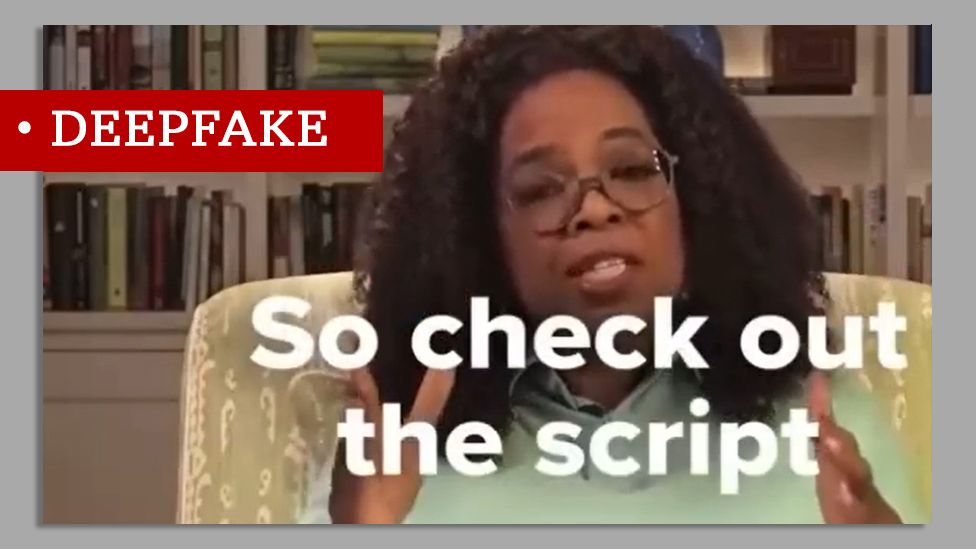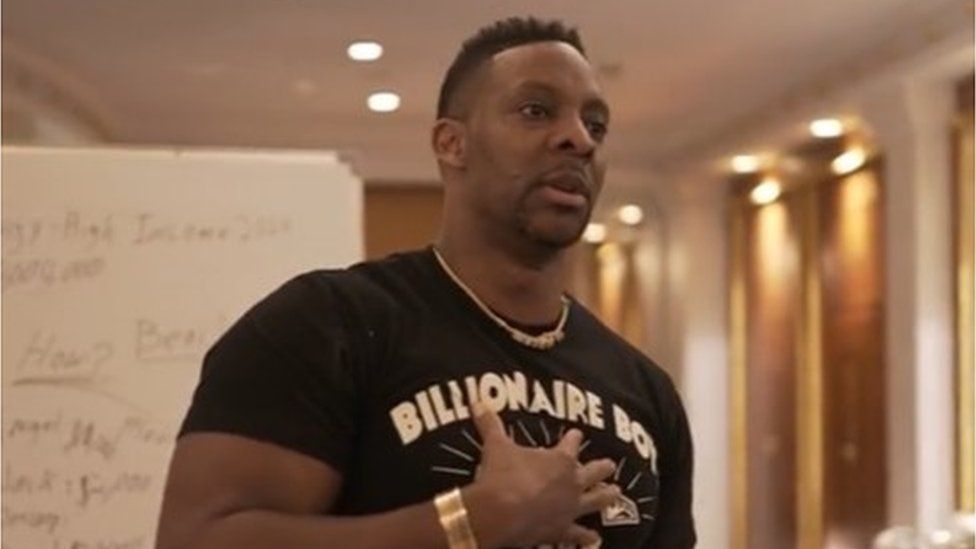Piers Morgan and Oprah Winfrey ‘deepfaked’ for US influencer’s ads

Celebrities including Piers Morgan, Nigella Lawson and Oprah Winfrey have criticised the use of AI deepfake online adverts that gave the false impression they had endorsed a US influencer’s controversial self-help course.

The adverts promoted the so-called “Genie Script”, the centrepiece of a “manifestation” course sold for $37 (£29) a time by Wesley “Billion Dollar” Virgin.
He describes himself as a motivational coach who has 1.1 million followers on Instagram and claims to be worth $40m.
The videos, used to lure buyers to purchase the product, claim the Genie Script is a “missing” Hebrew Bible scripture of just 20 words that could – supposedly – change your life.
One advert used footage of Nigella Lawson chatting about her recipes and work as a TV chef.
“I went on vacation and met this man at a very exclusive party. His name was Wesley and he handed me this hidden Bible page that was locked away in somebody’s room,” the voice said.
But it was not that of Lawson, it was the barely indistinguishable mimicry of an AI voice generator.
Real footage is overlaid with a deepfake impersonation of the food writer’s voice, making it sound like she was attributing her success directly to Wesley Virgin’s guidance.
The AI voice suggested that the script revealed by Virgin unlocked the secret to manifestation, a practice which involves thinking about or writing down your aspirations to turn them into reality.
“He said: ‘Repeat this mantra every single day of your life… Since that moment I’ve become a multimillionaire all on my own.”
A spokesperson for Lawson branded the advertisement “fraudulent” and “of great concern”.
Another advert showed what looked like an excerpt from the Piers Morgan Uncensored TV show and employed similar techniques.
The voice described “a lost old scripture that has been used by kings to attract vast riches, miraculous healing and unparalleled love”, and it looked like the mouth had been manipulated to fit the speech.
The real Piers Morgan told the BBC the advert was “another example of a very worrying trend of public figures being misused by deepfake AI manipulators for financial gain”.
“The real victims will be members of the public who unwittingly buy these products believing the celebrity endorsements are genuine,” he said.

“Reviews” of the script appear online, where users praise Virgin and say they hope the script will help them with escaping poverty or spending more time with their children or grandchildren.
Both adverts, which appeared on YouTube, have now been taken down.
A spokesperson for YouTube said it had “long prohibited the use of manipulated media, including deepfakes and other forms of doctored content to deceive or mislead users”.
Having reviewed these videos, Prof Hany Farid, a digital forensics expert at the University of California, Berkeley, said they were “clearly deepfakes”.
“Of course, as the technology to create these fake audio and video improves, it will become increasingly difficult to detect these fakes. And the technology is improving at a stunning rate,” he added.
Another advert, this time featuring Oprah Winfrey, was discovered in the Ad Library for the Meta platforms Facebook and Instagram. Genuine footage had been overlaid, again with AI providing fake dialogue sounding like the US chat show queen.
“I want to give you a 20-word script… think of it like installing a new operating system into your mind that’s programmed to make you rich,” the AI Oprah says.
A spokesperson for the real Oprah told the BBC she did not have anything to do with Virgin’s product.

“We seek to protect consumers from the false association of Ms Winfrey and the misuse of AI to create such false advertising,” they said.
Meta said it took action on the adverts it found to be in violation of its policies.
When the BBC contacted Wesley Virgin he said the adverts were “the work of affiliates”, people who can earn money by helping him make sales, and that he was “in the process of banning them all”.
But videos still prominent on the 44-year-old’s YouTube channel demonstrate the huge effort he has put into mentoring an online team of volunteers hoping to share in his fortunes, therefore boosting his own bank account.

With titles such as “Make $800+ A DAY Online For FREE Copy & Pasting Links!”, Virgin urges viewers to spread the word about his products, such as the Genie Script, across social media.
Promising rapid returns and a high commission rate, he encourages potential recruits to paste a web link to the sales platform Digistore24 into multiple meditation groups, along with messages promising a “free meditation” to those who click on it.
But the link would take users to an online check-out for Virgin’s manifestation courses – after they had watched a sales pitch video with outlandish claims and an inaccurate account of theological history.
The narrative of this video centred on a supposed “missing” page from the Bible that carries a powerful prayer script. The rich and famous knew the secret script, the narration claimed, and warned that “they’re willing to put a bullet into anyone’s head who exposes them”.
Alongside the assertions was the seemingly antisemitic claim that Jewish people were disproportionately wealthy because they “use manifestation secrets” taken from an ancient 1,100-year-old “uncensored” Hebrew Bible that included the page that was “missing” from regular Bibles.
Prof Nathan McDonald, a theology academic at the University of Cambridge, said the video referred to the Codex Sassoon, a very early Hebrew Bible which recently generated attention when it was sold at auction for $38m.
“It does not have an additional page with a ’20-word script’,” he said. “Instead, alas… it has been damaged and is lacking a few pages.”
He added that the Genie Script’s promotional videos seemed to draw on “New Thought” religious belief, which has its roots in late 19th Century America and has influenced some parts of Christianity through the so-called prosperity gospel. It suggests that healing and prosperity are available to Christian believers if they have enough faith.
YouTube users who clicked on the faked Piers Morgan and Nigella Lawson adverts were directed to a similar video but this version was embellished with what appeared to be more celebrity endorsements.
Another celebrity featured without permission was the Canadian TV star and businessman, Kevin O’Leary. His spokesman said the clip of the entrepreneur had been purchased via a website that sells personalised messages from celebrities, and misused.
“Kevin will be taking the appropriate action to have it removed immediately. Kevin does not know Wesley and has no affiliation with him or any of his businesses,” he said.
The Oprah advert directed to another similar video, and then a shop for the product.
The sales platform Digistore24 also distanced itself from Virgin. It said his use of affiliate web links had violated its terms and guidelines and it would end its business relationship with him.
Wesley Virgin has not responded to further requests from the BBC to explain his business practices.
Despite being criticised by celebrities, he is far from disheartened. Recent social media posts suggest he is still actively selling the “dream”, claiming he can teach people how to become millionaires.
Source: BBC







